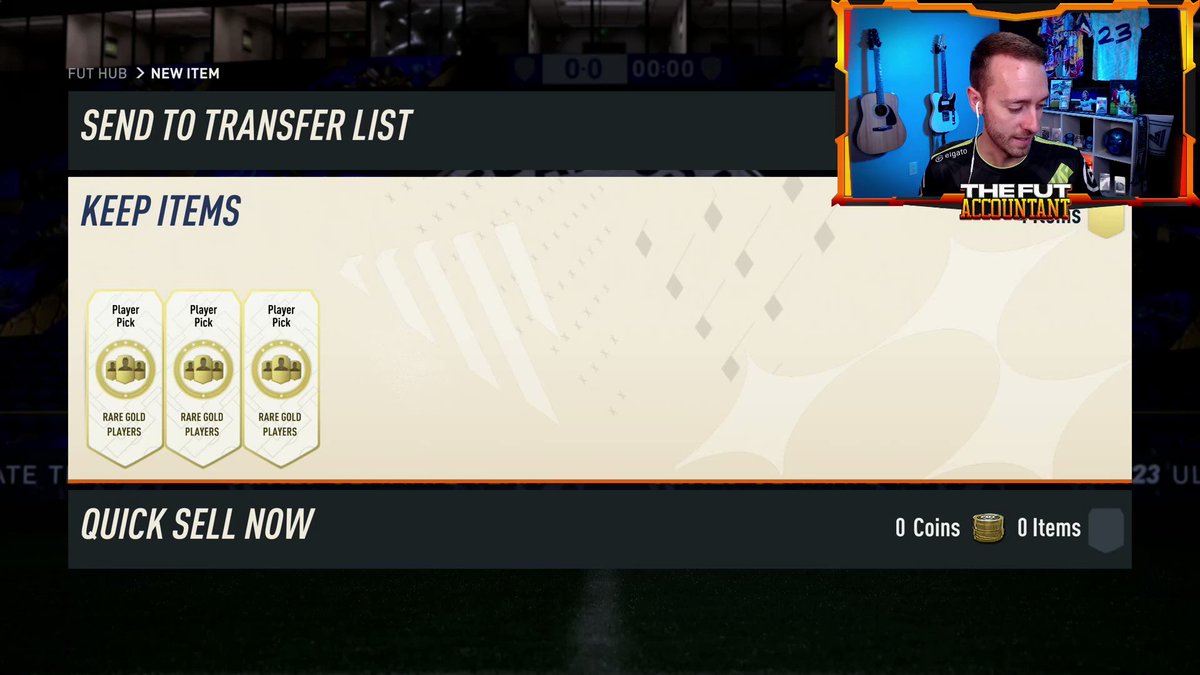Imagine this: You're building your dream team in FIFA Ultimate Team (FUT), but the coins are flying out of your account faster than you can say "Ronaldo." Enter the role of a FUT accountant – your financial wizard in the world of soccer gaming. If you've ever wondered how to manage your FUT finances like a pro, you're in the right place. This guide will take you through everything you need to know to become the ultimate FUT accountant.
Managing your FUT account is more than just buying and selling players. It's about strategy, discipline, and knowing when to hold or fold. Just like in real life, financial management in FUT can make or break your gaming experience. So, whether you're a casual player or a hardcore FUT enthusiast, understanding the role of a FUT accountant can help you save those precious coins for that next big purchase.
Now, you might be thinking, "Do I really need a FUT accountant?" The short answer is yes. With the right strategies, you can turn your FUT account into a money-making machine. But before we dive deep into the nitty-gritty, let's break down what exactly a FUT accountant does and why it's so crucial for your gaming success.
If you're ready to take control of your FUT finances and build a team that rivals the best, keep reading. This guide will walk you through every step, from understanding the basics to mastering advanced techniques. Let's get started!
What is a FUT Accountant?
A FUT accountant is essentially your financial advisor in FIFA Ultimate Team. Think of them as the person who helps you make smart decisions about buying, selling, and trading players, as well as managing your overall budget. Their role is to ensure that your FUT account stays healthy and that you're not overspending on players or packs.
Here’s a quick breakdown of what a FUT accountant does:
- Monitors Market Trends: They keep an eye on the FUT market to identify the best times to buy or sell players.
- Tracks Finances: They help you keep track of your coins, ensuring you don’t overspend.
- Optimizes Profits: They find ways to maximize your profits through clever trading strategies.
- Provides Guidance: They offer advice on which players to invest in and which ones to avoid.
Having a FUT accountant—whether it's you or someone else—can make a huge difference in your gaming experience. By staying on top of your finances, you can focus more on building your dream team and less on worrying about running out of coins.
Why You Need a FUT Accountant
Let's face it: FIFA Ultimate Team can be expensive. Between buying packs, trading players, and upgrading your squad, it's easy to lose track of your finances. That's where a FUT accountant comes in. Here are a few reasons why having one is essential:
First off, a FUT accountant helps you avoid impulse buys. We've all been there—seeing a rare player on the Transfer Market and snapping them up without thinking twice. But those impulse buys can quickly drain your account. A FUT accountant will help you stay disciplined and make smarter financial decisions.
Second, they keep you informed about market trends. The FUT market is constantly changing, and staying up-to-date can be overwhelming. A FUT accountant will monitor these changes and alert you to opportunities to buy low and sell high.
Lastly, they help you optimize your profits. By finding the best deals and maximizing your trades, a FUT accountant can turn your account into a money-making machine. Whether you're a casual player or a serious competitor, having a FUT accountant can give you a significant advantage.
Key Responsibilities of a FUT Accountant
So, what exactly does a FUT accountant do day-to-day? Here’s a closer look at their key responsibilities:
- Tracking Coins: Keeping a close eye on your coin balance to ensure you're not overspending.
- Market Analysis: Monitoring the Transfer Market for trends, price fluctuations, and potential investments.
- Player Valuation: Assessing the value of players to determine whether they're worth buying or selling.
- Trade Strategies: Developing and executing trading strategies to maximize profits.
- Financial Planning: Creating a budget and sticking to it to ensure long-term financial stability.
These responsibilities might sound overwhelming, but with the right tools and strategies, anyone can become a successful FUT accountant. The key is staying organized and disciplined.
How to Become a FUT Accountant
Becoming a FUT accountant isn't as hard as it sounds. With a bit of practice and the right mindset, you can start managing your FUT finances like a pro. Here’s a step-by-step guide to help you get started:
Step 1: Understand the Basics
Before you dive into the world of FUT accounting, it's important to understand the basics. Familiarize yourself with the Transfer Market, player values, and how to read market trends. Knowing these fundamentals will give you a solid foundation to build on.
Step 2: Set a Budget
One of the most important things a FUT accountant does is set a budget. Decide how much you're willing to spend on players, packs, and other items, and stick to it. This will help you avoid overspending and keep your account healthy.
Step 3: Monitor the Market
The FUT market is constantly changing, so it's important to stay on top of trends. Keep an eye on player prices, demand, and supply to identify opportunities to buy low and sell high. Tools like FUTBIN can be incredibly helpful for this.
Step 4: Develop a Trading Strategy
Once you have a good understanding of the market, it's time to develop a trading strategy. Decide whether you want to focus on short-term trades or long-term investments, and stick to your plan. Consistency is key when it comes to trading in FUT.
Step 5: Stay Disciplined
Finally, stay disciplined. It's easy to get carried away with impulse buys or emotional trades, but a good FUT accountant knows when to hold and when to fold. Stick to your budget and trading strategy, and you'll see results over time.
Tools Every FUT Accountant Needs
Having the right tools can make a huge difference in your success as a FUT accountant. Here are a few must-haves:
- FUTBIN: A comprehensive database of player prices and market trends. It's a great resource for tracking player values and identifying profitable trades.
- Transfer List Manager: A tool that helps you keep track of your bids and listings on the Transfer Market. It's essential for staying organized and avoiding missed opportunities.
- Market Alerts: Set up alerts to notify you when player prices drop or rise. This will help you act quickly and take advantage of market fluctuations.
- Budget Tracker: Use a spreadsheet or app to track your coin balance and monitor your spending. This will help you stay within your budget and avoid overspending.
With these tools at your disposal, you'll be well-equipped to manage your FUT finances like a pro.
Common Mistakes to Avoid
Even the best FUT accountants make mistakes from time to time. Here are a few common pitfalls to watch out for:
- Impulse Buying: Resist the urge to buy players on a whim. Always do your research and make informed decisions.
- Overtrading: Don't trade too frequently. This can lead to unnecessary losses and missed opportunities.
- Ignoring Market Trends: Stay on top of market trends to avoid buying high and selling low. Use tools like FUTBIN to stay informed.
- Not Setting a Budget: Without a budget, it's easy to overspend. Set a limit and stick to it to ensure long-term financial stability.
Avoiding these mistakes will help you become a more successful FUT accountant and improve your overall gaming experience.
Advanced Techniques for FUT Accountants
Once you've mastered the basics, it's time to take your FUT accounting skills to the next level. Here are a few advanced techniques to consider:
1. Flipping Players
Flipping players is a popular strategy among FUT accountants. It involves buying low and selling high to make a quick profit. To succeed at flipping, you need to be quick on the draw and have a good understanding of market trends.
2. Long-Term Investments
Another strategy is to make long-term investments in players. This involves buying players at a low price and holding onto them until their value increases. It requires patience and a good understanding of player potential.
3. Timing the Market
Timing the market is all about knowing when to buy and sell. By monitoring market trends and price fluctuations, you can identify the best times to make trades and maximize your profits.
These advanced techniques can take your FUT accounting skills to the next level. With practice and patience, you'll be able to turn your FUT account into a money-making machine.
Conclusion: Take Control of Your FUT Finances
Managing your FUT finances doesn't have to be overwhelming. With the right strategies and tools, anyone can become a successful FUT accountant. By staying organized, disciplined, and informed, you can take control of your FUT account and build the team of your dreams.
So, what are you waiting for? Start implementing these tips today and see the difference it makes in your gaming experience. And don't forget to share this guide with your friends and fellow FUT enthusiasts. Together, we can all become better FUT accountants and dominate the Transfer Market!
Table of Contents


